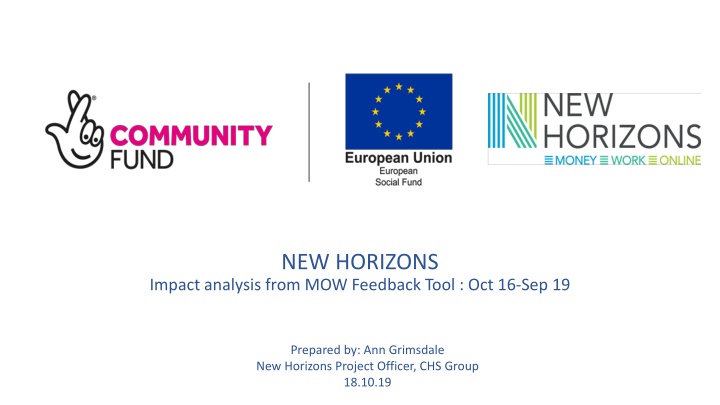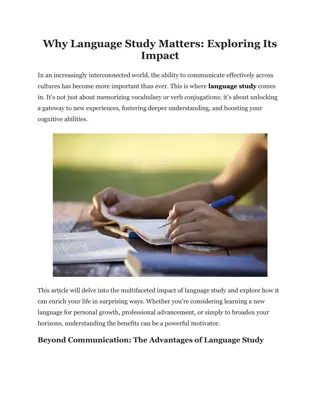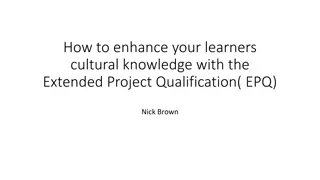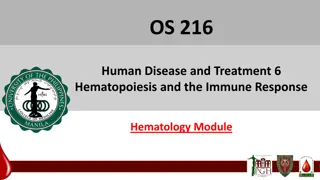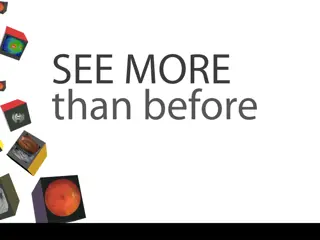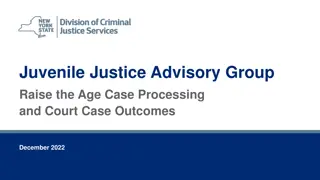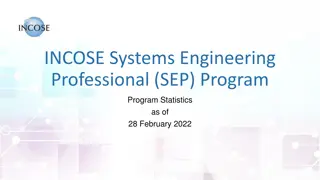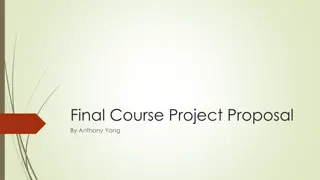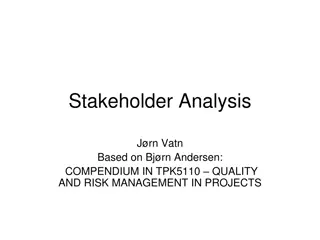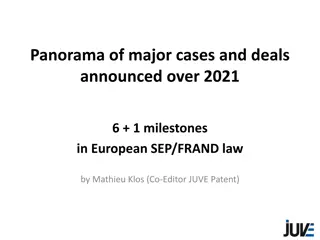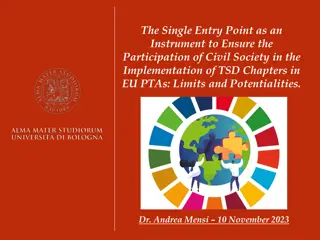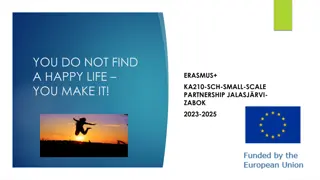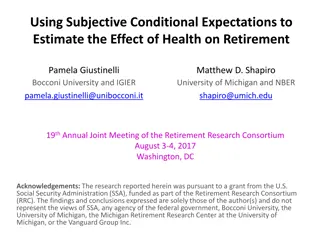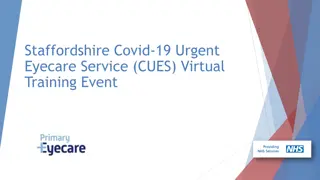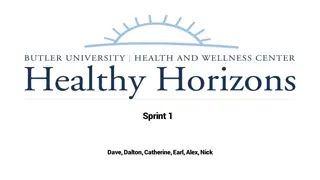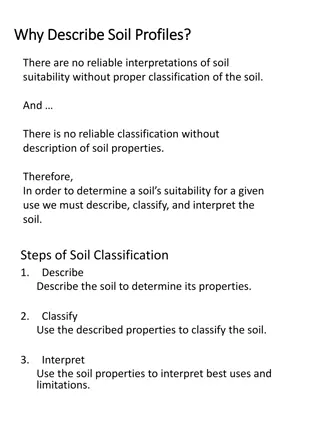Impact Analysis of New Horizons Project: Oct 16 - Sep 19
The impact analysis of the New Horizons project from Oct 16 to Sep 19, conducted by Ann Grimsdale, reveals key insights. Participants enrolled in New Horizons exhibit higher rates of unemployment, economic inactivity, and disabilities compared to the UK population. The analysis also highlights successes in reducing money-related stress and worry by aiding participants in budgeting and accessing support, while challenges remain in areas like planning for change and building work confidence.
Download Presentation

Please find below an Image/Link to download the presentation.
The content on the website is provided AS IS for your information and personal use only. It may not be sold, licensed, or shared on other websites without obtaining consent from the author.If you encounter any issues during the download, it is possible that the publisher has removed the file from their server.
You are allowed to download the files provided on this website for personal or commercial use, subject to the condition that they are used lawfully. All files are the property of their respective owners.
The content on the website is provided AS IS for your information and personal use only. It may not be sold, licensed, or shared on other websites without obtaining consent from the author.
E N D
Presentation Transcript
NEW HORIZONS Impact analysis from MOW Feedback Tool : Oct 16-Sep 19 Prepared by: Ann Grimsdale New Horizons Project Officer, CHS Group 18.10.19
Context who enrols with NH New Horizons enrolled UK NH Index vs. UK population population profile Given the recruitment criteria for the project, unsurprisingly those who enrol with New Horizons are far more likely to be unemployed or economically inactive than the UK population overall. % % 1=parity Men 42 49 0.86 Women 58 51 1.14 Any disability/longstanding disability* 67 26* 2.57 They are also much more likely to be in single adult, with kids households and to be somewhat younger than the overall UK population. Aged under 25 25 12 2.08 25-49/25-54* 49 53 Circa 1 50+/55+* 25 35 Circa 0.5 Finally, 2 in 3 New Horizons enrollers report a disability, compared with only about a quarter of the overall UK population to declare a longstanding disability. Single adult, with dependent kids 16 3 5.33 Econ inactive, inc. NEET 60 16 3.75 Unemployed 40 7 5.71 Base: Approx 450 NH enrolled to Sep19. UK population data from Money Advice Service Jan 19 Market Segmentation Study. 2
Context: MOW variables Item MOW focus Short name Full variable description Getting help and advice about money, being online and/or work when needed A Multi GETHELP MOW RATING SCALE Holding a current account and using it without incurring penalty charges B Money BANKING Budgeting and planning ahead for essentials C Money BUDGETING I am good at this Meeting monthly living costs including one-off payments without getting into debt D Money ENDSMEET Getting the best deals when buying things (e.g. goods and services) E Money GETDEALS I am not sure Level of stress and worry related to money F Money STRESS Using the internet to save money and access information G Online NETUSE This causes me problems Taking part in activities that build skills and confidence H Multi SELFDEV Confidence in finding voluntary and/or paid work I Work WORKCONF Planning ahead and managing changes in work and money situation J Multi CHANGE 4
Key Findings OVERVIEW At the outset, almost all MOW aspects are scored in the red that is participants report MOW mean scores of 3 or below out of 7. Amongst those had engaged with the project by September 2019 (i.e. having given at least one round of further MOW feedback) MOW mean scores rise, on average, by between 1.5 and 2.5 points, i.e to around 5 out of 7. The strongest successes for the project appear to lie in reducing money- related stress and worry. It would appear to do this most clearly by helping participants work out how to budget and meet their monthly living costs, and equipping them with the knowledge about where to get help and advice in future. The least successful initial impacts appear to relate to issues such as being able to plan ahead to manage change, and gaining confidence around work. 5
A: GETHELP: Getting help and advice about money, being A: GETHELP : Getting help and advice about money, being online and/or work when needed. online and/or work when needed. Entry (ALL) vs. post-engagement It appears that the specialist, tailored coaching approach is helping to signpost help clearly for participants, and this is a key benefit to participants in the New Horizons project. This MOW variable covers all three MOW aspects (Money, Online and Work), and the change is dramatic: from about 3 in 5 finding it a problem, to about 4 in 5 saying they are now good at this aspect of MOW management. (And it records one of the strongest rises in mean scores, of +2.5) Any GREEN = 22% Any RED = 61% NET Sentiment -39 ALL - Entry 20% 18% 23% 18% 10% 6% 6% Any RED = 11% Any GREEN = 83% ENGAGE-post +72 2%3% 6% 7% 17% 34% 32% This causes me problems 2 3 I am not sure 5 6 I am good at this 6 Base: ALL entry (approx. 450). ENGAGERS post (approx. 190). NET sentiment= Any Green % minus Any Red %. Could range from +100 to -100
B: BANKING: Holding a current account and using it without B: BANKING : Holding a current account and using it without incurring penalty charges. incurring penalty charges. Entry (ALL) vs. post-engagement Whilst relatively fewer people report this as a problem (compared with other MOW aspects), it s still a clear success for the project post engagement only 1 in 10 regard holding a bank account without charges as a problem, and nearly 9 in 10 feel confident to say they are good at this. Any RED = 38% Any GREEN = 50% NET Sentiment +12 ALL - Entry 16% 9% 13% 13% 13% 12% 25% Any RED = 10% Any GREEN = 86% ENGAGE-post +76 3%2% 5% 5% 12% 25% 49% This causes me problems 2 3 I am not sure 5 6 I am good at this 7 Base: ALL entry (approx. 450). ENGAGERS post (approx. 190). NET sentiment= Any Green % minus Any Red %. Could range from +100 to -100
C: BUDGETING: Budgeting & planning ahead for essentials. C: BUDGETING : Budgeting & planning ahead for essentials. Entry (ALL) vs. post-engagement A good outcome for this MOW variable. Nearly 2 in 3 participants are experiencing problems with budgeting for essentials when they arrive at NH; but a greater proportion, 3 in 4, are feeling confident about it once they have received the 121 coaching help. Any RED = 64% NET Sentiment Any GREEN = 25% -39 ALL - Entry 27% 18% 19% 11% 12% 6% 7% Any RED = 14% Any GREEN = 74% ENGAGE-post +60 2% 5% 7% 13% 21% 30% 23% This causes me problems 2 3 I am not sure 5 6 I am good at this 8 Base: ALL entry (approx. 450). ENGAGERS post (approx. 190). NET sentiment= Any Green % minus Any Red %. Could range from +100 to -100
D: ENDSMEET: Meeting monthly living costs, including one D: ENDSMEET : Meeting monthly living costs, including one- -off payments without getting into debt. payments without getting into debt. Entry (ALL) vs. post-engagement off As with budgeting for essentials, this is another good success factor for the project. About two-thirds feel that meeting monthly living costs without getting into debt is a problem at the start of the project; this changes dramatically to three-quarters saying they are good at this post-engagement. (And the rise in mean score is one of the strongest, at +2.5 points). Any GREEN = 19% Any RED = 67% NET Sentiment -48 ALL - Entry 30% 20% 17% 14% 8% 5% 6% Any RED = 13% Any GREEN = 75% ENGAGE-post +62 3% 3% 7% 12% 24% 26% 25% This causes me problems 2 3 I am not sure 5 6 I am good at this 9 Base: ALL entry (approx. 450). ENGAGERS post (approx. 190). NET sentiment= Any Green % minus Any Red %. Could range from +100 to -100
E: GETDEALS: Getting the best deals when buying things E: GETDEALS : Getting the best deals when buying things (e.g. goods and services). (e.g. goods and services). Entry (ALL) vs. post-engagement Perhaps because of the circumstances which accompany participants at the outset of the project, enrollers are already relatively confident at feeling they obtain the best deals when buying things. Net sentiment is positive (i.e. 7% more state they are good at this than that is causes them a problem) at the beginning of the project. Nonetheless, once people have engaged, getting deals becomes one of the strongest positive outcomes for the project, with some 85% saying they are good at this aspect. Any GREEN = 45% Any RED = 38% NET Sentiment +7 ALL - Entry 12% 12% 14% 18% 17% 18% 10% Any RED = 7% Any GREEN = 85% ENGAGE-post +78 2% 1%4% 9% 22% 31% 32% This causes me problems 2 3 I am not sure 5 6 I am good at this 10 Base: ALL entry (approx. 450). ENGAGERS post (approx. 190). NET sentiment= Any Green % minus Any Red %. Could range from +100 to -100
F: STRESS: Level of stress & worry related to money F: STRESS : Level of stress & worry related to money Entry (ALL) vs. post-engagement 4 in 5 participants are reporting a problem with their levels of stress and worry related to money at the outset of the project. Indeed, with 1 in 2 ticking the lowest possible rung on the ladder, it s by far the MOW aspect on which participants appear to struggle the most. The change to being in the green (any of the three boxes indicating I am good at this ) post-engagement with New Horizons is impressive with the majority, 62%, being able to say they are now good at (managing this stress. It would be interesting to monitor this over time, once the 121 coaching ends. Any RED = 80% Any GREEN = 12% NET Sentiment -68 ALL - Entry 48% 20% 12% 8% 5% 5% 2% Any RED = 22% Any GREEN = 62% ENGAGE-post +40 7% 5% 10% 16% 26% 23% 13% This causes me problems 2 3 I am not sure 5 6 I am good at this 11 Base: ALL entry (approx. 450). ENGAGERS post (approx. 190). NET sentiment= Any Green % minus Any Red %. Could range from +100 to -100
G: NETUSE: Using the internet to save money and G: NETUSE : Using the internet to save money and access information. access information. Entry (ALL) vs. post-engagement Given the levels of money-related stress that enrollers report, growing internet skills appears to be marginally a second-issue order of importance. Even though about half of all those entering the project report having a problem with using the internet to save money and access information, that still leaves it as one of the issues causing relatively lower levels of reported problems than others. Post-engagement, whilst 7 in 10 say they are good at this online MOW aspect, this in fact places it at a relatively low level of success (compared with other factors). Any GREEN = 29% Any RED = 53% NET Sentiment -24 ALL - Entry 27% 13% 13% 17% 10% 13% 6% Any GREEN = 69% Any RED = 19% ENGAGE-post +50 7% 4% 8% 12% 18% 25% 26% This causes me problems 2 3 I am not sure 5 6 I am good at this 12 Base: ALL entry (approx. 450). ENGAGERS post (approx. 190). NET sentiment= Any Green % minus Any Red %. Could range from +100 to -100
H: SELFDEV: Taking part in activities that build skills and H: SELFDEV : Taking part in activities that build skills and confidence. confidence. Entry (ALL) vs. post-engagement As with gaining internet skills, there are relatively lower percentages of people claiming confidence building as a problem at the outset, and the rise to those in the green is also relatively modest. That said, it still means a swing from 6 in 10 finding it a problem at the outset to 7 in 10 saying they are good at this, post engagement. This may be another variable to track over time? Any GREEN = 22% Any RED = 57% NET Sentiment -35 ALL - Entry 22% 19% 16% 20% 9% 8% 5% Any GREEN = 69% Any RED = 20% ENGAGE-post +49 4% 6% 10% 12% 21% 27% 21% This causes me problems 2 3 I am not sure 5 6 I am good at this 13 Base: ALL entry (approx. 450). ENGAGERS post (approx. 190). NET sentiment= Any Green % minus Any Red %. Could range from +100 to -100
I: WORKCONF: Confidence in finding voluntary and /or I: WORKCONF : Confidence in finding voluntary and /or paid work paid work Entry (ALL) vs. post-engagement This is an issue to watch; net positive sentiment post engagement at +35 is the just the lowest for all the variables measured, and not dissimilar to the outcomes for managing monetary stress and being able to manage change. Indeed, 1 in 4 report it still being a problem, post engagement. Anecdotally, it has been posited that a potential reason for this is that the combination of people s work & mental health histories may mean they are not yet in a position to gain work confidence. One to monitor in future, perhaps? Any GREEN = 21% Any RED = 63% NET Sentiment -42 ALL - Entry 27% 21% 15% 15% 10% 6% 5% Any RED = 24% Any GREEN = 59% ENGAGE-post +35 10% 5% 9% 18% 19% 20% 20% This causes me problems 2 3 I am not sure 5 6 I am good at this 14 Base: ALL entry (approx. 450). ENGAGERS post (approx. 190). NET sentiment= Any Green % minus Any Red %. Could range from +100 to -100
J: CHANGE: Planning ahead and managing changes in J: CHANGE : Planning ahead and managing changes in work and money situation. work and money situation. Entry (ALL) vs. post-engagement This appears to represent another big issue feeling able to manage change is the next biggest problem area (after stress) for participants on entry, with about 3 in 4 reporting it as a problem. Whilst the shift is to about 6 in 10 saying they are good at this, post-engagement, it is perhaps important to note that only 14% feel able to tick the top positive box on this aspect (as is the case with managing stress). Any GREEN = 13% Any RED = 73% NET Sentiment -60 ALL - Entry 29% 23% 21% 14% 7% 4% 2% Any RED = 20% Any GREEN = 61% ENGAGE-post +41 7% 4% 9% 18% 28% 19% 14% This causes me problems 2 3 I am not sure 5 6 I am good at this 15 Base: ALL entry (approx. 450). ENGAGERS post (approx. 190). NET sentiment= Any Green % minus Any Red %. Could range from +100 to -100
Whats next for New Horizons? Thinking about targets are we struggling to move people from economically inactive into job search because we are enrolling people who really need a different service? Is there a gap for people who need longer term support and employment isn t the right/only answer? Our conference November 21st at Eddington. Fully booked but will share outcomes from the day with this group Evaluation: focus on participants who have left the project - 6 months plus. What can we learn about effecting real change? The voice of lived experience focus groups with the University, aims to link in with other lived experience groups Food poverty event in March on February 19th
